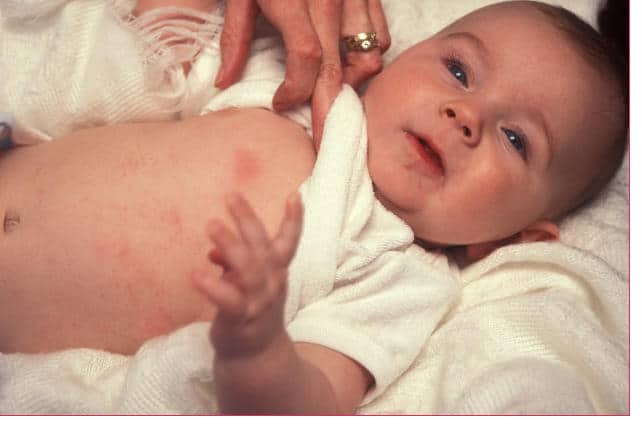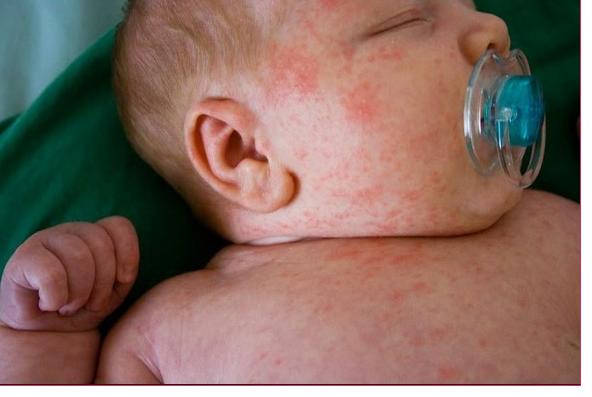Cow Milk Allergy in Children
We have created a guide article that is relevant to the symptoms of cow milk allergy in children. Families with cow milk allergy problems can read this article and get information.
What is cow milk allergy?
Child’s milk or cow milk after a food intake as a result of an immunological reaction against one or more milk protein in the child around the lips, redness, redness and rash on the skin, such as the appearance of symptoms, blood appearing in the blood, eczema, allergic symptoms such as the emergence of cow milk protein allergy.
How many types of cow milk allergies are there?
There are three types. Type 1, Type 2 and Type 1 and Type 2 are combined with 3 types. Type 1 can cause serious allergic reactions and usually symptoms may be seen in the first 2 hours. In type 2 and in mixed type, symptoms occur more than 2 hours later, and the chance of recovery is usually higher.
What is the frequency of cow milk allergy?
The frequency of reaction to cow milk protein is between 5-15%. Most of these reactions are not allergies. Allergy to cow milk protein in children is seen between 2-6%. Allergy to cow milk in children often begins before the age of 1 year.
In the first 6 months, cow milk allergy only in breast milk is seen in five of a thousand children. That is, feeding the baby with breast milk is protective against the development of cow’s milk allergy. Therefore, it is very important that the baby is exclusively breastfed for the first 6 months.

Why is cow milk allergy important?
Serious allergic reactions can be seen in infants with cow milk by taking a food containing cow milk. In children with severe allergies, we may face a situation that threatens the life we call allergic shock. In addition, if a good diet is not organized, it may result in growth and failure. For this reason, cow milk protein allergy is important.
What are the symptoms of cow milk allergy?
Immediately after cow milk ingestion or during the first 2 hours, redness, itching, wheezing in the lung, cough, angioedema and allergic shock symptoms can be seen. Symptoms of blood in the blood, constipation, reflux, eczema (atopic dermatitis), gas pain lasting longer than 3 hours, bleeding in the lung, pulmonary hemosiderosis in the lung, allergic reactions in the intestine and stomach It can show.
In conclusion, cow milk protein allergy should be suspected in the following cases:
- After intake of milk or food;
- Redness around the lips, redness of the body, swelling of the tongue and lips
- If you’re coughing and wheezing
- If there are signs of allergic shock such as breathing impurities and ecstasy
- If my training is improved
- And If blood is seen
- If constipation does not respond to treatment
- If the patient is vomiting
- If the pain lasts more than 3 hours and lasts longer than 3 weeks, you should come to mind cow’s milk allergy and contact with the child allergist.

What is the cause of cow milk allergy?
It is caused by allergic reactions of the body against the proteins in cow milk. In cow’s milk an allergic reaction develops against casein and Whey proteins. Genetic is very important in allergic diseases. The risk of cow milk allergy is high in children with allergic diseases. The risk of developing cow’s milk allergy is higher in babies with allergic diseases such as asthma, allergic rhinitis, eczema and food allergy.
How is cow milk allergy diagnosed?
Infants and children with cow milk allergy symptoms are examined by pediatric allergy specialists. If cow milk allergy is considered, skin allergy test is performed. If necessary, the blood is taken from the cow’s milk allergy and other common allergies. As a result of these tests, the degree of allergy is determined. Therefore, it is very important that the allergy test is carried out under the supervision of a child allergy specialist or under the supervision of the correct technique and method. It is decided whether or not to carry out a loading test according to the degree of allergy.
Testing by inexperienced people can lead to very serious unintended consequences. It is highly inconvenient to give diet according to test results only. It can lead to unnecessary diet and as a result may lead to deterioration in the growth and development of the child. As a result, the diagnosis is made by detailed history, allergy tests, elimination diet and, if necessary, loading test. Experience and specialization are very important for definite diagnosis. With the blood tests, no cow’s milk allergy is diagnosed.
How old can a skin allergy test be performed?
Skin can be tested from 2 months onwards. It does not cause problems because the child does not hurt much. However, it is important to carry out this test with a child allergy specialist or under his supervision.
Should the allergy test be done from the blood or the skin?
Skin allergy tests are more valuable because they give more accurate results and they can be seen in many foods at the same time and give results in 15-20 minutes. Blood tests can be performed in suspected cases with skin testing. Tests made by blood alone cannot be relieved due to the quality of the device and the quality of the device. However, children may be preferred by allergy specialists who are familiar with the allergy testing method.
What is cow milk allergy treatment?
There are diet, drug treatment and oral disintegration treatments in the treatment of cow’s milk allergy. Diet of cow milk allergy, Diet is the most important part of treatment. Firstly, foods containing cow milk protein should not be consumed. It is also important that food not cross-reacting to cow’s milk is also given.

How should breast-fed babies be fed?
Cow’s milk protein passes into breast milk. For this reason, the mother should also diet with cow milk protein and cross-reacting food. However, the mother may not need to diet if there is no problem in the child when the mother breaks the diet.
How should babies with cow milk allergy be fed?
Babies with cow milk allergy should be fed with food that does not contain cow milk protein if they need additional food. However, it is very important to make a definitive diagnosis before giving these foods. Normal foods should not be given because they contain cow’s milk protein. It may even cause serious consequences if the cow milk contains a protein containing food. Very careful for him.
Can I give you goat’s milk instead of cow milk?
Children with cow milk allergy are generally allergic to other animal milk. Goat milk allergy is also present in 80% of children with allergy to cow’s milk.
If a child with a cow milk allergy diagnosis is given goat’s milk and there is no problem, there is probably a problem in the diagnosis of cow milk allergy.
Goat milk may have been in vain for a long time because its nutritional value is low. This may adversely affect the feeding of the child. For this reason, if a cow’s milk allergic goat’s milk is given, a child allergy specialist should be referred to confirm this diagnosis. Goat milk is not preferred for real cow milk allergy.
Drug therapy in cow milk allergy
There is no drug treatment in cow’s milk allergy. In children with pruritus due to cow milk allergy, itching medicines and skin conditioner and moisturizers can be used. Breath tightening and wheezing can be used in breath-taking drugs. In severe allergic reactions (allergic shock), epinephrine (adrenaline) auto-injector may be used.
How to use epinephrine (Adrenaline) auto-injector
Families of children with cow’s milk allergy should have an epinephrine auto-injector.
Adrenalin is very important if a child with cow’s milk allergy has taken cow’s milk and developed a serious allergic reaction (such as redness in the body, itching, breathing).
4-5 finger from the right side of the child’s leg and knee should be applied from above. These auto-injectors are injected with a 90-degree angle on the right side of the leg after removing the back cover of the syringe and injecting the injector by itself for 10 seconds.
Oral immunotherapy (vaccine treatment) in cow’s milk allergy is the oral administration of allergens of cow’s milk allergens at regular doses starting from small doses, with the aim of desensitizing patients (nutritional therapy) and developing permanent tolerance (improvement of cow’s milk allergy).
There is no standard protocol yet. Successful results are reported. However, severe reactions can be observed in patients with adjustment problems during treatment.
This treatment can be performed after 3 years of age and is usually recommended after 5 years of age. Because cow’s milk allergy has a high chance of self-healing until the age of 5 years.
Will cow s milk allergy improve?
The improvement of cow’s milk allergy may vary depending on whether or not there are asthma and allergic colds, age of diagnosis, allergies to other foods, and the severity of allergy. Generally, cow’s milk allergies improve until the age of 1. Up to the age of 1, 45-55%, 60-70% until 2 years of age, 80-90% up to 3 years of age and 90% improvement until 5 years of age. These rates may vary in various studies.
Which doctor should treat cow milk allergy?
Specialists in the diagnosis, treatment and follow-up of cow’s milk allergy Specialists who are pediatric allergy experts and specialized in Child Allergy from pediatric health specialists.
Our previous article Swollen lip causes , symptoms and treatment in the title swollen lip ve swollen lip causes information is provided..

Hello, I’m Dorothy. I love writing and researching articles. Reading books about baby health, care and pregnancy is my favorite. I will be sharing delicious and healthy information on food and baby food during pregnancy.












Thank u for shareing this article….never new abt it …thank for useful info…we always consider cow milk the best…never knew that there can be allergies of that also on kids..
This is super interesting to read about. Someone close to me has a nut allergy but I had no idea a milk allergy could be so severe
So interesting I had no idea a milk allergy could be so severe
Thank you for sharing didn’t realise some child can have allergies
Great article, some good advices for ppl that don’t know those things about milt allergy.
Great article , very interesting
I had no idea that cows milk could cause so many types of allergies in children.
Did you know that cow’s milk allergy is the most common food allergy in childhood and the numbers of sufferers are…
Conclusion: Exposure to cow’s milk protein in the first 3 months of life was associated with a reduced risk of cow’…
Great good article
Very good information, not many parents are aware of this!
A2 milk is a cow’s milk that is growing in popularity. But is it truly easier on your gut than regular milk?
Lactose, lactose intolerance or cow’s milk allergy? cow milk allergy in children is very important for baby health
Omg so good, love.
BBC News – Cow’s milk allergy: ‘Going to a coffee shop could kill my child’
Cow’s milk allergy: ‘Going to a coffee shop could kill my child’
Such a great article